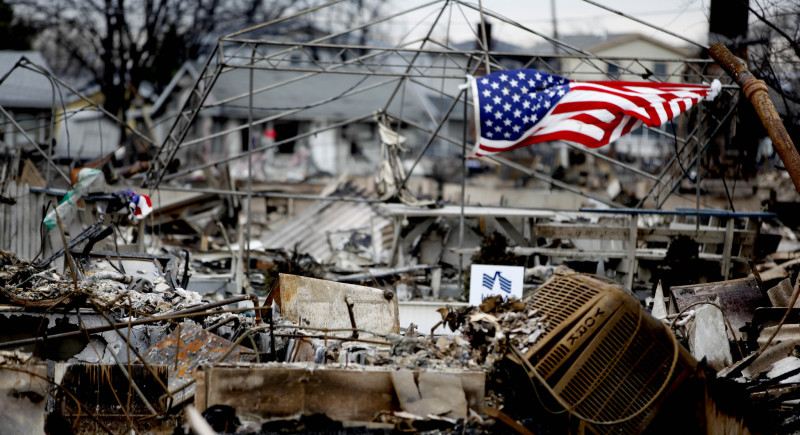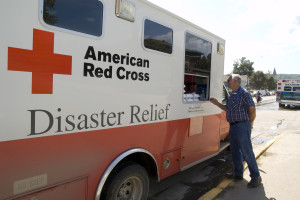By Jackie Faye March 10, 2015

Breezy Point, New York after Hurricane Sandy. ©DVIDS/Flickr
Thousands of Americans turn to the Red Cross when disaster strikes, but a joint investigation by ProPublica and NPR may make donors think twice before they write another check.
Jesse Eisinger, Justin Elliott, and NPR started asking questions about how the nonprofit spent money during Hurricanes Sandy and Isaac after they got a tip from someone in the know. That tip started an 8-month investigation that turned up some troubling information. Among their key findings: children were sheltered next to sex offenders, emergency vehicles were taken away from aid work and used as props during press events, and while the Red Cross managed to give out flashlights, they forgot the batteries needed to operate them.
Their story on the Red Cross is far from over. After it ran, Sen. Charles Grassley demanded the Red Cross explain more clearly how it uses public donations. And this summer, the US Government Accountability Office is releasing its own report about how the Red Cross spent money during Hurricanes Sandy and Isaac. In the meantime, Elliott and NPR are continuing to dig into the iconic nonprofit, this time focusing on how it spent donations made to help victims of the massive earthquake that rocked Haiti in 2010.
Just last month, the Red Cross demanded some corrections to the story, but the reporters stand by their findings. The charity, which takes in hundreds of millions of dollars in donations each year, still has not released detailed records that describe how it spent its money after those two massive storms wreaked havoc along the coast in 2012.
Non-profits are not subject to public records requests; they are also not legally required to file the same kinds of documents that public companies do, which makes them harder to investigate. So how did Eisinger and Elliott dig up the dirt on the Red Cross? I sat down with both them to find out.
Eisinger has been with ProPublica since 2009, covering Wall Street and finance. He won a Pulitzer Prize for a series on questionable Wall Street practices in 2011. Before landing at ProPublica, he was the Wall Street editor of Conde Nast’s Portfolio magazine, and worked at The Wall Street Journal. Elliott has been with ProPublica since 2012. He previously reported for Salon.com and TPMmuckraker. Before that he was a fact-checker at Mother Jones. He has also taught an investigative reporting class at Columbia University. An edited excerpt of our conversation is below. You can read their full story here.
Jackie Faye: You have said this story started as a tip. Can you tell me about that?
Eisinger: We got a tip from somebody who was in a position to know, and they could not see how the Red Cross spent money on Sandy in New Jersey. We tried to figure out how much they spent there and essentially came up dry. We sort of thought it was a bust, but in doing so we were looking through their filings. They put out these elaborate reports about how much they had done for Sandy victims, but if you actually sort of thought about it for more than 10 minutes you could see that it was not particularly meaningful. The numbers did not actually tell you anything substantive about what they actually delivered, but we thought we should write what we don’t know and at least shake the trees a little bit.
Elliott: And we talked to them also. We put all this to them and they gave us virtually nothing that had not already been released publicly.
Eisinger: They declined to break things out by geography, which was proof that they lacked transparency, and they should not have. It is a non-profit. This is what they do, and this is one of the main things that they do. They should be accountable to their donors and to the public.

American Red Cross Administrative Headquarters © Josh
Elliott: You can’t do a FOIA on the Red Cross itself because it is a private non-profit, but you can FOIA for interactions that the Red Cross had with government agencies, so we did that. I ended up getting a letter in the mail where the Red Cross had hired this law firm Gibson Dunn, a very expensive prominent law firm, to fight one of public records requests in New York State. Under the law they get the chance to object to public records requests on certain grounds, one of which is that the information contains trade secrets. They were fighting one of our requests on those grounds, but what could a trade secret be in terms of disaster response?
Eisinger: I mean, if they figured out a secret way to save people’s lives, they wouldn’t tell the Salvation Army?
Elliott: So we wrote a story about it and it ended up getting a lot of pick up online. It went sort of semi viral. We had also included a call out for tips and information with my email address and that ultimately lead to getting some key sources and documents. That was really the key break.
Faye: Is that how you were able to get your hands on these confidential reports and internal emails?
Eisinger: Yes. I mean current and former employees gave them to us.
Faye: How did you know to question the Red Cross’s claim that, “91 cents of every dollar that’s donated goes to our services?”
Eisinger: What they were doing was making two different claims: one that “91 cents of every dollar that’s donated goes to our services,” and another that “91 cents of every dollar we spend goes to our services.” And on its face it did not make any sense. You just had to look at their public financials. We put it to them and they had no explanation, and then they had the statement removed from their website after we started asking questions, so we knew then that we were right.
Elliott: And it wasn’t like once or twice. They were consistently saying this statement that simply was not true and they had been saying it for years.
Faye: In covering this story, did you find yourself getting mad?
Eisinger: I think the public has a right to know that the Red Cross is misrepresenting how it spends money, and wasting money, and also diverting assets for public relations purposes. Burnishing its image to get more donations while depriving people of services, yes, I think that would make any reader pretty outraged.

American Red Cross disaster relief truck. © Patsy Lynch / Wikimedia Commons
Elliott: Apart from my own opinion, I think the most egregious thing in our story is that at the greatest moment of need, the Red Cross was taking trucks that were supposed to be delivering food and relief supplies, and literally calling the drivers and saying, “Turn around. We need your truck as a backdrop during this press conference for the whole day.”
Faye: One statement I found particularly outraging is that a Red Cross executive from headquarters said the vehicles belonged to the CEO and she could do whatever she wanted with them.
Eisinger: I think what has happened is that the Red Cross has had a history of problems and mismanagement, and this corporate executive Gail McGovern came in and said she would turn the place around and make it more efficient, but has actually seemed to have turned it into a place for burnishing her image and the image of the Red Cross at the expense of victims and the competence of the organization. She seems to have a personal hold on the organization that many of our sources found deeply troubling.
Faye: Did you feel that the Red Cross tried to intimidate you or your sources at any point?
Eisinger: They definitely tried to intimidate our sources.
Elliott: In one instance we were talking to a guy and he kept delaying his interview. Then, I got an email from him that had a word document with his statement, but if you look at the metadata of the document it says this law firm created it, and if you look up the firm they do business with the Red Cross. I mean this is a guy I thought I was talking to candidly, but it was pretty clear from the document that some law firm had drafted this thing. They were definitely trying to work the sources to manage the message.
Faye: What is the ultimate goal of this story?
Eisinger: The Red Cross is a very important institution in America and it is given an official role by the government in disaster relief, so what I would hope would happen is that the Red Cross is now going to be competent about disaster relief. That is what we need, and that is what many of our sources who continue to work, volunteer, and dedicate their lives to the Red Cross have said to us is that the Red Cross is unprepared for the next serious disaster. And, if the scientists are right, and global warming is actually making natural disasters worse, we need the Red Cross more than ever.

Red Cross in Haiti. © International Federation of Red Cross and Red Crescent Societies/ Flickr
Faye: What’s next? It looks like you want to trace the money spent in Haiti?
Elliott: NPR and I are doing reporting right now about Haiti. There was this devastating earthquake in Haiti in 2010. The Red Cross raised almost $500 million, which is more than what they raised for Sandy. We are looking into how that money was spent and if it was spent well. If anyone has any information on that they should email me at [email protected].
****
Jackie Faye will graduate from Columbia University with a MA in business journalism in 2015. Previously, she reported in Norfolk, VA at Newschannel 3 (CBS), Raleigh, NC, at NBC-17, Columbia, SC at WIS (NBC), and Oklahoma City, OK. She has a decade of experience in journalism. Media General honored her coverage of drug shortages in 2012. After her report aired, a federal class action lawsuit was filed on behalf of cancer patients who could not access lifesaving chemotherapy drugs. She is a graduate of Georgetown University’s Institute of Political Journalism.
This entry was posted on Tuesday, March 10th, 2015 at 6:00 am. It is filed under Behind the Story, Q&As and tagged with Haiti earthquake, Hurricane Isaac, hurricane sandy, Red Cross. You can follow any responses to this entry through the RSS 2.0 feed.
Comments are closed.
